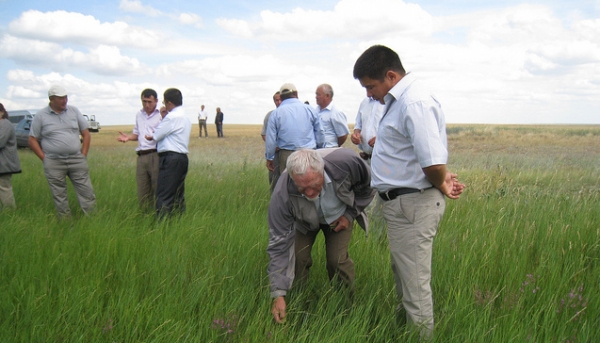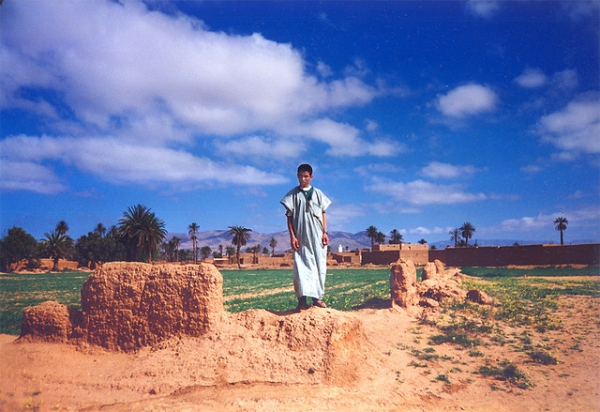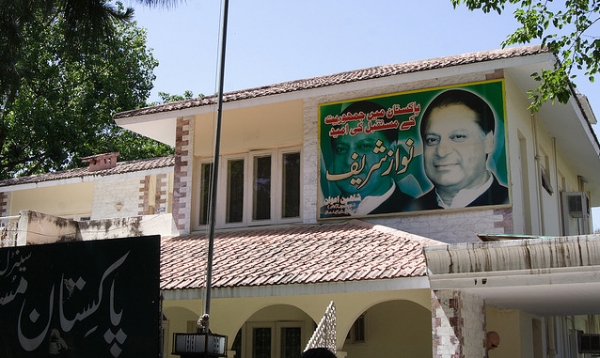Welcome to Around the World! This week we focus on bettering the world through food security, childhood education, technology, and more.
 | Tim Hans: Should Your Birthplace Determine Your Future? Photographer Tim Hans tells the story behind his "Should Your Birthplace Determine Your Future?" photography exhibit, on display at the National Press Club in Washington, D.C. throughout the month of August 2013. Read more about it here. |
 | Technology, led by ICT, presents solutions to some of the world's most pressing global challenges in areas like financial inclusion, healthcare, education, and disaster management. Read more about it here. |
 | “Too-big-to-fail” syndrome still prevails, but it does not take into account the implicit subsidies associated with it. Are banks that are "too big to fail" also "too big to manage"? Read more about it here. |
 | To Feed the Future, We Need a Feast of Facts and a Famine of Fear Feeding the future will rely on technology, but equally important is a world with access to accurate, science-based information about new and emerging technologies. Read more about it here. |
 | Israel, Palestine and…Tamazgha? Indigenous North Africans and the Israeli-Palestinian Conflict The Amazigh people are the indigenous ethnic group of North Africa, a region they know as Tamazgha. The ethnic and religious pluralism advancing by Amazigh political activism opens up space for substantive and critical discussion about the Israeli-Palestinian conflict in an otherwise hegemonic atmosphere. Read more about it here. |
 | Nawaz Sharif’s Inability to Control Pakistan’s Extremists After he was re-elected Pakistan's Prime Minister in May 2013, many people believed Nawaz Sharif would be able to take Pakistan in a new direction. Instead, they find they have elected someone who is only perpetuating Pakistan's problems. Read more about it here. |
Around the Web
The drums of war with Syria are beating louder than ever this week, after an estimated 500 to 1000 men, women, and children were killed outside of Damascus last week. Many U.S. government officials believe the large-scale casualties are the result of a chemical weapons attack, and a United Nations inspection team, while dodging sniper fire, is working quickly to access the evidence before it is destroyed. What options does President Obama, who drew the famous red line in Syria at the use of chemical weapons, now have?
This Week in History
1968: Soviet-led forces invade Czechoslovakia to halt pro-democracy reforms, and crush the “Prague Spring” liberalization drive of Alexander Dubcek’s regime. Protests against the invasion followed, during which dozens of people were killed and hundreds more injured.


a global affairs media network
Around the World!

August 26, 2013
Welcome to Around the World! This week we focus on bettering the world through food security, childhood education, technology, and more.
 | Tim Hans: Should Your Birthplace Determine Your Future? Photographer Tim Hans tells the story behind his "Should Your Birthplace Determine Your Future?" photography exhibit, on display at the National Press Club in Washington, D.C. throughout the month of August 2013. Read more about it here. |
 | Technology, led by ICT, presents solutions to some of the world's most pressing global challenges in areas like financial inclusion, healthcare, education, and disaster management. Read more about it here. |
 | “Too-big-to-fail” syndrome still prevails, but it does not take into account the implicit subsidies associated with it. Are banks that are "too big to fail" also "too big to manage"? Read more about it here. |
 | To Feed the Future, We Need a Feast of Facts and a Famine of Fear Feeding the future will rely on technology, but equally important is a world with access to accurate, science-based information about new and emerging technologies. Read more about it here. |
 | Israel, Palestine and…Tamazgha? Indigenous North Africans and the Israeli-Palestinian Conflict The Amazigh people are the indigenous ethnic group of North Africa, a region they know as Tamazgha. The ethnic and religious pluralism advancing by Amazigh political activism opens up space for substantive and critical discussion about the Israeli-Palestinian conflict in an otherwise hegemonic atmosphere. Read more about it here. |
 | Nawaz Sharif’s Inability to Control Pakistan’s Extremists After he was re-elected Pakistan's Prime Minister in May 2013, many people believed Nawaz Sharif would be able to take Pakistan in a new direction. Instead, they find they have elected someone who is only perpetuating Pakistan's problems. Read more about it here. |
Around the Web
The drums of war with Syria are beating louder than ever this week, after an estimated 500 to 1000 men, women, and children were killed outside of Damascus last week. Many U.S. government officials believe the large-scale casualties are the result of a chemical weapons attack, and a United Nations inspection team, while dodging sniper fire, is working quickly to access the evidence before it is destroyed. What options does President Obama, who drew the famous red line in Syria at the use of chemical weapons, now have?
This Week in History
1968: Soviet-led forces invade Czechoslovakia to halt pro-democracy reforms, and crush the “Prague Spring” liberalization drive of Alexander Dubcek’s regime. Protests against the invasion followed, during which dozens of people were killed and hundreds more injured.


